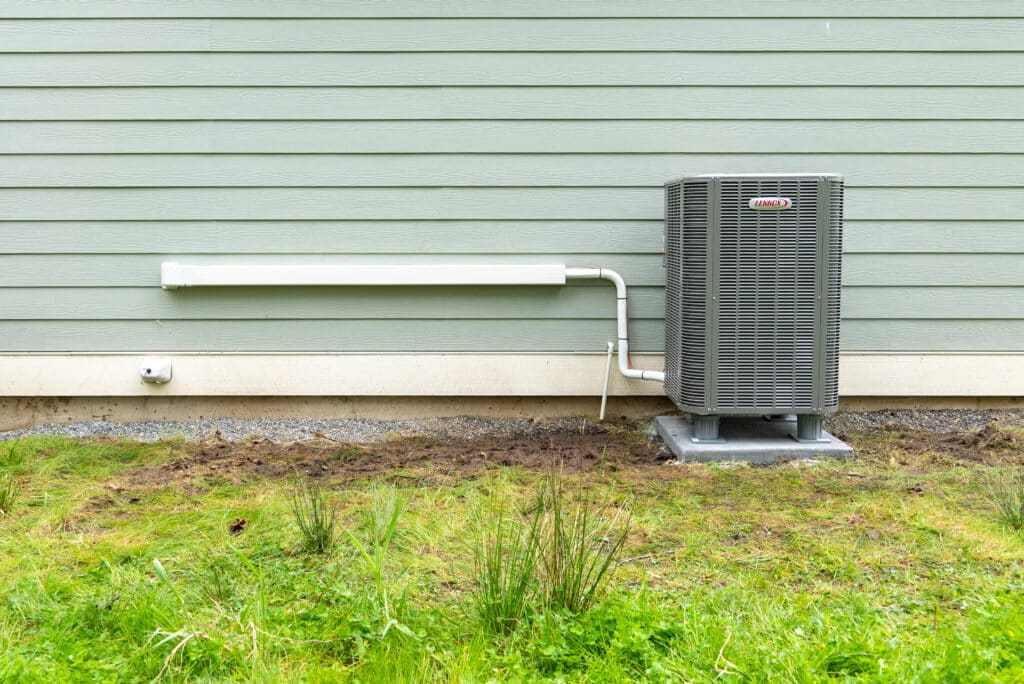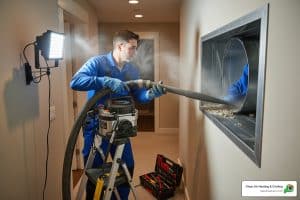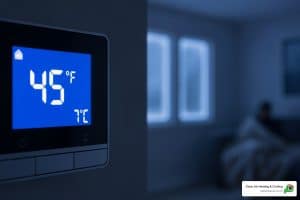Average cost to repair air conditioner is a pressing concern for many homeowners. Whether it’s a minor issue like a thermostat glitch or something more significant like a compressor failure, understanding the factors that influence repair costs is crucial. Before diving into detailed solutions, here are key points to consider:
- Repair costs vary greatly depending on the type of issue and the air conditioner model.
- Labor costs can significantly affect the overall pricing, especially if specialized skills are required.
- Part replacements like capacitors and compressors are some of the more costly repairs.
- Regular maintenance can help in delaying or even reducing these costs.
In addition to these points, the importance of professional service can’t be overstated. A professionally repaired air conditioner not only ensures immediate comfort but can also offer long-term savings by enhancing energy efficiency.
I’m Colin Matei, the owner and president of Clean Air Heating & Cooling. With experience in HVAC services, I understand the intricacies of the average cost to repair air conditioner. Over the years, I’ve helped countless homeowners steer AC repairs effectively and efficiently.

Average cost to repair air conditioner vocab to learn:
– Free quote air conditioning repair
– Free HVAC repair estimates near me
– Free HVAC service call
Factors Affecting Air Conditioner Repair Costs
When it comes to air conditioner repairs, several factors can influence the overall cost. Understanding these can help you plan and budget effectively.
Type of Air Conditioner
The type of air conditioner you have plays a significant role in determining repair costs. Here’s a quick breakdown:
- Central AC: Typically more affordable to repair compared to other systems. Common issues include insufficient cooling and leaky fluids.
- Ductless Mini-Split: Repairs tend to be pricier due to their complexity. Common problems include leaks and refrigerant issues.
- Geothermal Systems: These are generally more expensive to repair because of their unique setup and the specialized knowledge required.
- HVAC Package Units, Portable Units, Swamp Coolers, and Window Units: Costs can vary widely, with portable and window units usually being the most budget-friendly to fix.
Type of Repair
Different repairs come with different price tags. Here’s what you might expect for some common fixes:
- Air Filter Change: One of the least expensive repairs, usually straightforward.
- Blower Motor, Capacitor, and Circuit Board Repairs: Mid-range costs due to the parts and labor involved.
- Compressor and Condenser Repairs: Among the most costly repairs, often requiring specialized skills.
- Drain Clogs and Ductwork Repairs: Costs can vary based on the complexity and extent of the issue.
Labor Costs
Labor is a significant component of repair costs. Here are some factors to consider:
- Hourly Rates: HVAC technicians typically charge between $65 to $150 per hour.
- Service Call Fees: Expect a service call fee ranging from $75 to $200.
- Emergency Repair Fees: These can double the usual rates, especially during peak seasons or off-hours.
Location
Where you live can also impact repair costs:
- Regional Cost Variations: Urban areas with a high cost of living generally have higher labor and material costs.
- Climate Impact: In regions with extreme weather, demand for repairs can spike, driving up prices.
Additional Costs
Beyond the basic repair, there are additional costs to keep in mind:
- Maintenance Contracts: These can offer savings by covering regular maintenance and minor repairs.
- Warranties: Manufacturer or home warranties might cover some repair costs, reducing your out-of-pocket expenses.
- Inspection Costs and Permits: In some cases, especially for significant repairs or replacements, you may need inspections or permits, adding to the total cost.
Understanding these factors can help you better anticipate the average cost to repair air conditioner issues and make informed decisions about maintenance and repairs.

Next, we’ll dig into the average cost to repair air conditioner, breaking down common repairs and their costs to give you a clearer picture of what you might expect when it’s time to call a professional.
Average Cost to Repair Air Conditioner
When your air conditioner needs fixing, costs can vary widely. Let’s break down what you might expect to pay for common repairs and replacement parts.
Common Repairs and Their Costs
- Air Filter Change: This is one of the simplest and least expensive fixes. Regularly changing your air filter can help keep your system running efficiently and prevent larger issues down the line.
- Blower Motor Repair: If your air conditioner isn’t blowing air as it should, the blower motor might be the culprit. These repairs can range in cost depending on the complexity of the issue.
- Capacitor Replacement: A faulty capacitor can cause your AC to fail to start or stop running unexpectedly. Replacing it is a common repair that typically falls into the mid-cost range.
- Circuit Board Repair: Circuit board issues can disrupt your AC’s functionality. These repairs can be more intricate and therefore more costly.
- Coil Repairs: Both evaporator and condenser coils are crucial for cooling. If they’re damaged or leaking, repairs can be quite expensive.
- Compressor Repairs: The compressor is like the heart of your AC. Repairs or replacements are often among the most expensive, sometimes making it more economical to consider a new unit if your system is old.
- Condenser Repairs: Issues with the condenser can affect the cooling efficiency and overall operation of your AC. These repairs are typically costly.
- Drain Clog Fix: A clogged drain can lead to water damage. Fixing this is usually straightforward and less expensive.
- Ductwork Repairs: Leaky or damaged ducts can significantly reduce efficiency. Costs vary based on the extent of the damage.
- Expansion Valve Repairs: This component regulates refrigerant flow. Repairing or replacing it can be moderately costly.
- Fan Motor Repairs: If the fan motor fails, your AC won’t circulate air properly. Repair costs are generally mid-range.
- Freon Leak Repairs: Fixing leaks and recharging Freon can be expensive, especially as older units that use R-22 Freon are being phased out.
- Thermostat Repairs: Sometimes, the issue is as simple as a faulty thermostat, which is relatively inexpensive to fix.
Cost Breakdown by Replacement Part
Here’s a quick overview of the average costs associated with replacing key parts in your air conditioner:
- Capacitor: Replacement costs can range widely, reflecting the part’s role in starting the AC.
- Circuit Board: Costs vary based on the complexity and brand of your unit.
- Compressor: One of the most expensive parts to replace, often prompting consideration of a full unit replacement if other issues exist.
- Condenser Coil: These can be costly to replace, especially in older systems.
- Contactor: A relatively less expensive part, but crucial for the AC’s operation.
- Drain Pan: Replacement is usually on the lower end of the cost spectrum.
- Evaporator Coil: Costs can be high, making it a significant repair.
- Expansion Valve: Mid-range in cost, but essential for regulating refrigerant.
- Fan Motor: Replacement costs vary, but it’s a common repair.
- Fuses and Relays: Generally inexpensive to replace.
- Thermostat: Costs vary depending on whether you choose a basic or smart thermostat.
Knowing these details can help you plan for the average cost to repair air conditioner issues, ensuring you make informed decisions when repairs are needed. Next, we’ll explore when it’s time to repair versus replace your air conditioner.
When to Repair vs. Replace Your Air Conditioner
Deciding whether to repair or replace your air conditioner can be a tough decision. It’s essential to weigh the costs and benefits of each option to make the best choice for your home and budget.
Signs It’s Time to Replace
- Frequent Breakdowns: If your AC is constantly breaking down, it’s likely time for a replacement. Frequent repairs can add up quickly, and a new unit may be more cost-effective in the long run.
- High Repair Costs: A good rule of thumb is the $5,000 rule. Multiply the age of your AC by the cost of the repair. If the result is more than $5,000, replacing the unit may be wiser.
- Age of Unit: Most air conditioners last 12-15 years. If your unit is nearing or past this age, consider replacing it, especially if it requires significant repairs.
- Energy Efficiency: Older units tend to be less energy-efficient, which can drive up your utility bills. Newer models are designed to be more efficient, saving you money over time.
- R-22 Freon Usage: If your AC still uses R-22 Freon, it’s time to consider an upgrade. R-22 has been phased out due to environmental concerns, and refilling this refrigerant can be costly.
Cost Comparison
When it comes to costs, consider both the immediate expenses and long-term savings.
- Repair Costs: While repairing might seem cheaper upfront, frequent fixes can accumulate, making a new unit more economical.
- Replacement Costs: Replacing your air conditioner can be a significant investment, but it often leads to lower energy bills and reduced maintenance costs.
- Long-Term Savings: A new, energy-efficient unit will likely save you money on utility bills and reduce the need for repairs, offering substantial long-term savings.

Evaluating these factors can help you determine whether to repair or replace your air conditioner. Up next, we’ll dive into the pros and cons of DIY versus professional air conditioner repair.
DIY vs. Professional Air Conditioner Repair
When your air conditioner starts acting up, you might wonder if you can fix it yourself or if it’s time to call in a pro. Let’s break down the pros and cons of each approach.
Simple DIY Repairs
Some air conditioner issues are simple enough for a DIY fix. Here’s what you can tackle on your own:
- Circuit Breaker and Thermostat: If your AC isn’t working, check the circuit breaker to ensure it’s not tripped. Also, make sure your thermostat is set correctly. These simple checks can save you an unnecessary service call.
- Air Filter Changes: Changing the air filter is one of the easiest and most effective ways to maintain your AC. A clogged filter can reduce efficiency and lead to more significant problems.
- Defrosting Coils: If your evaporator coils freeze, turn off the AC and run the fan to melt the ice. This can restore cooling without any tools.
- Replacing Fuses: If you’re comfortable with electrical work, replacing blown fuses can be a quick fix.
- Cleaning Condenser Coils: Keeping the condenser coils clean can improve efficiency. Use a garden hose to gently clean away dirt and debris.
These tasks are generally safe and don’t require specialized skills or tools.
When to Call a Professional
While DIY fixes are great for minor issues, some situations demand professional attention:
- Complex Repairs: Problems like compressor issues, refrigerant leaks, or electrical faults are best left to professionals. These repairs require specialized knowledge and tools.
- Safety Concerns: Working with electrical components or refrigerants can be dangerous. Professionals are trained to handle these safely.
- Warranty Considerations: If your unit is under warranty, DIY repairs might void it. Always check your warranty terms before attempting repairs.
Calling a professional ensures that the repair is done right the first time. It also provides peace of mind, knowing that your AC is in expert hands.
In the next section, we’ll explore how to save on air conditioner repair costs, including tips on maintenance and getting the best quotes.
How to Save on Air Conditioner Repair Costs
Keeping your air conditioner in top shape doesn’t have to break the bank. With a few smart strategies, you can save on repair costs and keep your unit running efficiently.
Regular Maintenance
Routine maintenance is key to avoiding costly repairs. Simple tasks like changing the air filter every one to two months can make a big difference. A clean filter helps your unit run smoothly and prevents dirt from clogging the system.
Annual tune-ups are another smart move. Scheduling a professional inspection once a year can catch potential problems before they turn into expensive fixes. During a tune-up, technicians will clean and inspect components, ensuring everything works as it should.
Don’t forget debris removal around your outdoor unit. Clear away leaves, grass, and other debris that can block airflow and reduce efficiency. Keeping the area tidy helps your AC work better and last longer.
Getting Multiple Quotes
When you need repairs, don’t settle for the first quote you receive. Getting multiple quotes allows you to compare prices and services. Here’s how to do it effectively:
- Research local technicians and check online reviews to find reputable companies.
- Ask each company about their experience, warranty offerings, and any guarantees on their work.
- Compare the details of each quote, not just the price. Look at the scope of work and the quality of parts used.
Taking the time to compare quotes can lead to significant savings and ensure you choose the best service provider.
Off-Season Repairs
Timing can also affect repair costs. Consider scheduling off-season repairs when demand for HVAC services is lower. Many companies offer discounts during the fall and spring, making it an ideal time for maintenance or non-urgent repairs.
Scheduling tips: Plan ahead and book your service before peak seasons. This not only saves money but also helps you avoid long wait times.
Warranty Knowledge
Understanding your warranty coverage can save you from paying out of pocket for certain repairs. Here are some key points to consider:
- Manufacturer warranties often cover parts for a specific period. Check the terms to see what’s included.
- Home warranties may cover your AC, depending on the plan. If you have one, read the fine print to know your coverage limits.
- Service contracts with HVAC companies can offer peace of mind. These contracts typically include regular maintenance and may provide discounts on repairs.
By staying informed about your warranties, you can avoid unnecessary expenses and ensure your AC is protected.
In the next section, we’ll dig into the decision-making process of when to repair versus replace your air conditioner.
Frequently Asked Questions about Air Conditioner Repair Costs
How much will it cost to fix an air conditioner that is not cooling?
The cost to fix an air conditioner that isn’t cooling can vary widely. Common repairs might include fixing a Freon leak, replacing a capacitor, or cleaning a clogged drain. Each of these repairs has a different cost range. For example, a Freon leak repair can be more expensive, especially if the leak is significant or hard to reach. On average, expect to pay anywhere from a low to a higher range depending on the complexity of the issue and the parts required.
Tip: Always get a detailed diagnosis from a professional technician to understand the exact problem and repair needed. This helps avoid unnecessary costs and ensures the issue is fixed correctly.
How often should you replace an air conditioner?
Air conditioners typically last 12 to 15 years. As your unit nears the end of its lifespan, you may notice more frequent breakdowns or higher utility bills. These are signs it might be time to consider a replacement. If your unit is still using R-22 Freon, which was banned in 2020 due to environmental concerns, it’s another indication that replacement could be more cost-effective in the long run.
Remember: Regular maintenance can extend the life of your air conditioner, delaying the need for replacement. Keep up with annual tune-ups and filter changes to maximize your unit’s lifespan.
Is it worth the cost to repair an air conditioner?
Deciding whether to repair or replace your air conditioner depends on several factors. One useful guideline is the $5,000 rule: multiply the age of your unit by the estimated repair cost. If the result is more than $5,000, replacement is often the better choice.
Consider the unit’s age, the cost of repairs, and your future plans. If the air conditioner is relatively new and the repair costs are reasonable, repairing is usually worthwhile. However, if the unit is old and the repairs are costly, investing in a new, more efficient system might save money in the long term.
In the next section, we’ll explore the decision-making process of when to repair versus replace your air conditioner.
Conclusion
In summary, understanding the average cost to repair an air conditioner can help you make informed decisions about maintenance and repairs. The costs can vary significantly based on the type of repair needed, the age of your air conditioning unit, and other factors. Keeping up with regular maintenance, like changing air filters and scheduling annual tune-ups, can prevent costly breakdowns and extend the life of your system.
At Clean Air Heating & Cooling, we pride ourselves on delivering exceptional service to our customers in Northwest Washington. Our commitment to customer satisfaction is reflected in our 25% utility savings guarantee and our numerous 5-star reviews. We aim to provide prompt, high-quality service, ensuring your home remains comfortable all year round.
If you’re facing issues with your air conditioner or simply want to ensure it’s running efficiently, consider reaching out to us. We offer comprehensive HVAC services and can help you determine whether repair or replacement is the best option for your situation.
For more information on our services, visit our HVAC Services page. We’re here to help you stay cool and save money!





